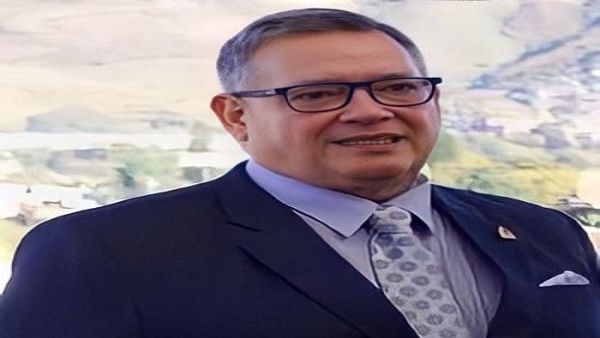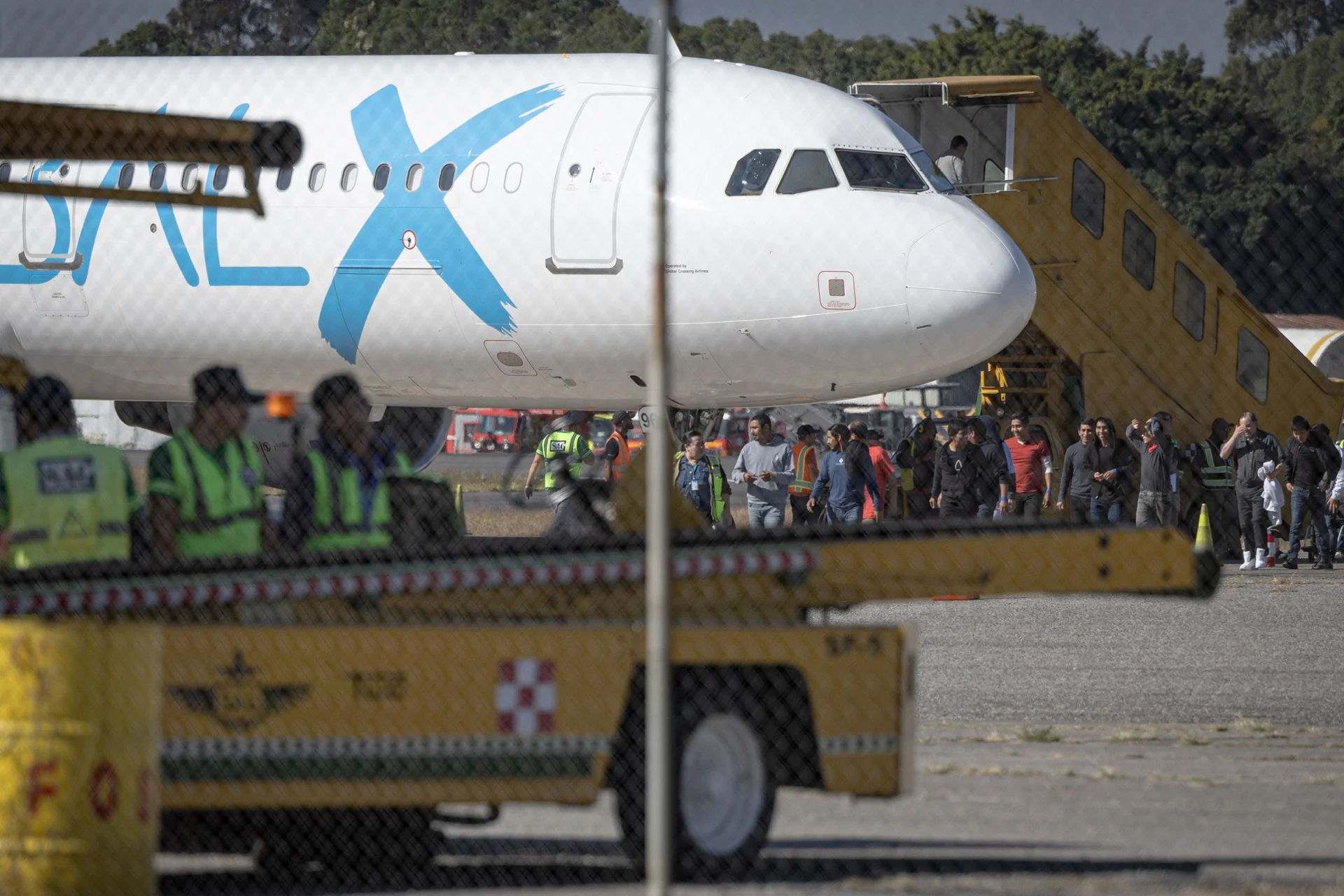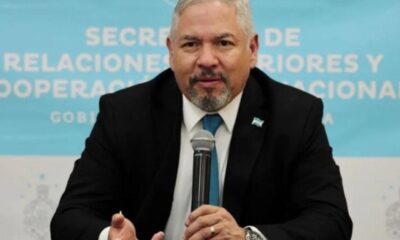Central America
Honduras rejects minister’s inclusion in list of alleged corrupt officials

December 22 |
The Honduran Secretary of Foreign Affairs and International Cooperation, Enrique Renia, rejected Thursday the inclusion of the Minister of Strategic Planning, Ricardo Salgado, in a report prepared by the US State Department with political and business actors of Central America allegedly linked to corruption cases.
“Honduras on principle rejects any unilateral measure contrary to international law, whether these are blockades, sanctions or lists drawn up in a subjective manner, as they are imposed mechanisms against sovereign countries,” the foreign minister stated through his X account.
He also expressed his solidarity with Salgado and condemned such “action for purely ideological reasons”. “It is absurd,” he pointed out.
For his part, Salgado published a statement in which he asserted that “the U.S. government has always been aligned with the corruption and impunity of the National Party and the Liberal Party in Honduras.”
“My inclusion in the Engel list only demonstrates that it is made under political criteria and does not defend democracy or honesty,” he declared.
In addition, he expressed his pride at being included in a list for political reasons, “for being on the side of the Honduran people and for ratifying my unwavering anti-imperialist condition”.
Former President Manuel Zelaya (2006-2009) joined the rejection of the unilateral U.S. list. Through X, the former president stated that “to include Salgado in the list of sanctioned persons of the United States, in spite of the fact that she has never had a visa, represents an absurdity in its imperialist policy against leaders of the Latin American left”.
In the opinion of Zelaya, who had to abandon the Presidency due to a coup d’état carried out in complicity with the White House, “the world has advanced in its ideas, while the United States has remained frozen”.
The White House included four Nicaraguans, four Guatemalans, three Hondurans and three Salvadorans in a new list prepared unilaterally and without any semblance of legitimacy.
They were included in this sanctioning list under the presumption that they are corrupt and anti-democratic actors, an aspect contained in Section 353, a tool that supposedly contributes to governance and institutional transparency.
On the Honduran side, in addition to Salgado, businessmen Mohamed Yusuf Amdani Bai and Cristian Adolfo Sánchez were included.
The list began with a total of 21 Hondurans; then 15 more were added in 2022. In 2023, another 13 officials, former officials and political figures were included.
Central America
Senator Van Hollen Meets with Deported MS-13 Member in El Salvador; Trump and Bukele React

U.S. Democratic Senator Chris Van Hollen, representing the state of Maryland, held a meeting in El Salvador with deported MS-13 gang member Kilmar Ábrego García, a member of the criminal group classified by the U.S. government as a terrorist organization.
“Kilmar Ábrego García, miraculously resurrected from the ‘extermination camps’ and ‘torture chambers,’ now sipping margaritas with Senator Van Hollen in the tropical paradise of El Salvador!” wrote President Nayib Bukeleon X (formerly Twitter), sharing photos of Van Hollen, Ábrego García, and a lawyer sitting together at a Salvadoran hotel.
The deported gang member is seen wearing a plaid shirt and a flat-brimmed cap, seated at a table with glasses and coffee cups. The senator also shared images of the meeting on his own social media accounts.
Bukele reaffirmed that Ábrego will remain in El Salvador and will not be returned to the United States.
“Now that his health has been confirmed, he has earned the honor of remaining under the custody of El Salvador,” Bukele added.
Former U.S. President Donald Trump criticized the senator’s meeting with Ábrego on Truth Social, calling Van Hollen “a fool” for advocating for Ábrego’s return to the U.S.
Central America
UN complaint filed against Costa Rica over detention of migrant children

A group of human rights lawyers has filed a complaint against Costa Rica, alleging that the Central American nation violated the rights of dozens of migrant children by detaining them in a rural facility for nearly two months after they were deported from the United States in February.
The children — some as young as 2 years old — are part of a larger group of migrants, mainly from Afghanistan, China, Russia, and other Asian countries, who were deported from the U.S. as part of a broader immigration crackdown under former President Donald Trump.
Many had hoped to seek asylum in the U.S. and expressed fear about returning to their home countries. Instead, they were dropped off in Costa Rica and Panama, where they do not speak the local language. Originally intended as brief transit points, these countries have become a state of limbo, with migrants stuck for over 50 days.
Critics argue this is part of a U.S. strategy to “export” its deportation process, while human rights advocates warn that Costa Rica and Panama are becoming a “black hole” for deported migrants.
In Costa Rica, around 200 migrants — including 81 children — were taken to a rural migrant processing center near the border with Panama and held in a building that once served as a factory.
The complaint, filed Thursday night by the Global Strategic Litigation Council (GSLC) and other human rights groups, was submitted to the UN Committee on the Rights of the Child, alleging that Costa Rica breached international agreements under the Convention on the Rights of the Child.
Silvia Serna Román, one of the attorneys involved, said the migrants were detained without legal status and had no access to education or mental health services in their native languages. The prolonged detention is raising concerns about long-term psychological effects on the children, as many parents report signs of emotional distress such as isolation and sadness.
“These children are in a very crucial stage of development, and they’ve already fled difficult conditions in their home countries,” Serna Román said on Friday. “Now, they’re being subjected to prolonged detention and inhumane treatment. Parents are worried.”
Serna Román also said the migrants have had little access to legal counsel. The Costa Rican government has stated that detainees can leave the facility if they agree to return to their countries of origin or apply for asylum in Costa Rica.
Central America
Nicaraguan Exiles to Mark 7th Anniversary of 2018 Protests with Global Commemorations

The Nicaraguan opposition in exile announced on Thursday that it will commemorate the seventh anniversary of the April 2018 protests against the government of President Daniel Ortega and his wife, Rosario Murillo, with events in Costa Rica, the United States, and several European countries.
The commemorative activities—which will call for justice for the victims, as well as freedom and democracy for Nicaragua—will include religious services, public forums, cultural fairs, and other public gatherings, according to official announcements.
In April 2018, thousands of Nicaraguans took to the streets to protest controversial reforms to the social security system. The government’s violent response quickly turned the demonstrations into a broader call for the resignation of President Ortega, who is now 79 and has been in power since 2007.
The protests resulted in at least 355 deaths, according to the Inter-American Commission on Human Rights (IACHR), although Nicaraguan organizations claim the toll is as high as 684. Ortega has acknowledged “more than 300” deaths and maintains the unrest was an attempted coup d’état.
-

 Central America4 days ago
Central America4 days agoNicaraguan Exiles to Mark 7th Anniversary of 2018 Protests with Global Commemorations
-

 International4 days ago
International4 days agoDominican ‘False Hero’ Arrested for Faking Role in Nightclub Collapse That Killed 231
-

 International3 days ago
International3 days agoACLU seeks emergency court order to stop venezuelan deportations under Wartime Law
-

 Central America3 days ago
Central America3 days agoUN complaint filed against Costa Rica over detention of migrant children
-

 International2 days ago
International2 days agoThousands rally nationwide against Trump’s threat to U.S. democracy
-

 Central America1 day ago
Central America1 day agoSenator Van Hollen Meets with Deported MS-13 Member in El Salvador; Trump and Bukele React
-

 International1 day ago
International1 day agoPope Francis Appears for Easter Blessing, Calls for Peace and Religious Freedom

















